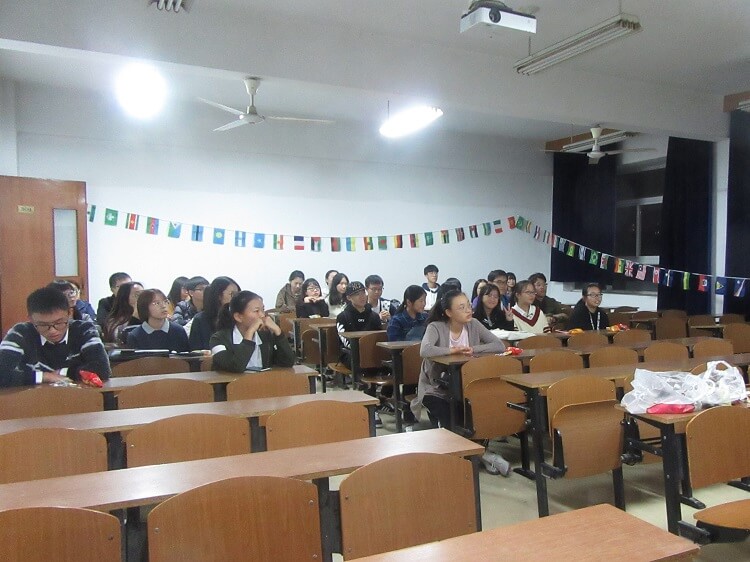When it comes to work, you’re probably used to good conditions, transparency, open communication channels and a salary that’s paid on time.
It’s only natural then that you would expect the same things teaching English in China, right?
I’m afraid this is not the case at all.
Your school in China can – and will – screw you over in many ways (28 at last count).
I’d like to lay it all out on the table for you so you know what you’re getting yourself into.
1. Huge class sizes in the public sector
If you teach in the West, class sizes are relatively small. In China, however, public school class sizes are huge.
You could have up to 50 students per class!
In one of the universities that I’ve taught at, two classes occupy one time slot.
That meant that come exam day, I was administering about 70 oral exams in just an hour and a half.
2. Not being able to really teach
Not only did the above-mentioned university expect teachers to cope with huge class sizes, but foreign teachers would only teach each class once and then test them seven weeks later.
It’s a crazy way of teaching if you ask me.
3. Evening and weekend classes
Nothing is sacred at some schools. Teaching times are by no means restricted between the hours of 8 am to 6 pm Monday to Friday.
You can be asked to teach in the evenings, weekends and even on Chinese public holidays.
If you teach at a language training center, you’re guaranteed to work nights and weekends.
4. No academic freedom
Some schools and universities are very bureaucratic and controlling.
You might get told exactly what the format of your exam has to be, how long student essays must be and what scores to give.
5. Unreasonable requests
If you teach English at a Chinese university, you could easily have up to 500 students across all your classes.
During exam time, your school might tell you to finish marking all 500 papers within three days. It has happened to me!
6. Not honoring contract terms
Some teaching contracts stipulate that the school will provide various appliances, like a microwave oven and TV.
Your school in China may not honor this, and if they do, the appliances may not work.
7. Being dodgy with money
When you move from one school in China to another, you need to have a medical checkup.
Although your new school will reimburse you for this, they might only pay what the checkup costs in their city.

Your school could be dodgy with money. Image by Moerschy from Pixabay.
8. Paying for your own utilities
In China’s public schools and universities, an apartment is usually provided as part of your teaching contract.
Some universities, however, will bill you for the water and electricity that you use.
9. Internet problems
At one school that I’ve taught at, TEFL teachers are given 200 free hours on the internet a month.
If you run out before the end of the month and want to top up, you’ll have to grapple with a self-service machine on campus that’s in Chinese.
See also: How to learn basic Mandarin
10. Sub-standard accommodation
I remember one apartment that I was forced to live in.
When I arrived, it was in a filthy state and the stove didn’t work. Worst of all, the water was electrified.
Want to teach English in China?
Get the free e-book now. Save and read later. No email address needed!
In dodgy Chinese buildings, if electric cables are too close to the water pipes you’ll get an electric shock whenever you touch the metal taps.
You just have to hope that the voltage isn’t going to be strong enough to kill you!
Also, don’t assume that your school will give you a full apartment. You could just be given a bedroom with an en suite kitchen and bathroom (trust me, I’ve been there).
11. Unpaid utility bills
After a hard day’s work, you just want to get into your apartment and have a well-deserved rest.
At one school, I got home one evening to find my apartment pitch-black.
But this wasn’t a blackout, the electricity had been cut off because the school hadn’t paid the utility bill!
12. Your school forgets that your apartment block is due to be demolished
Eh, what? Yeah, you read that right.
A school that I’ve taught at had been told months previously that the foreign teachers’ apartment block was due to be demolished.

Your school may be forgetful. Image by Beliakina Ekaterina from Shutterstock.
They didn’t do anything until the day the workmen arrived and started tearing down the building with us still living there!
13. You’re put in temporary accommodation
Guess what happened after the above-mentioned incident?
Yep, the school had to move all their teachers into temporary accommodation in hotels, believe it or not.
14. Nightmare students
Not long after I started teaching English in China, I learnt a very important lesson: Never teach at a private college.
Rich Chinese students will sleep through your lesson and complain about you behind your back. And that’s if they come to your class at all!
15. Having to share apartments
In every school I’ve taught English at in China, foreign teachers had an apartment each.
In one school however, two teachers had to share an apartment. Find out before you go.
16. Backstabbing school administrators
It’s no secret that student evaluations are what the schools use to assess teachers. Usually, the school might meet with class monitors on a regular basis.
There was one school, however, that went out of its way to collect rumors about teachers.
Sadly, it took gossip very seriously.
17. Tax issues
At one school, the salary I was paid was less than the figure stated in my contract.
When I queried this, I was told that taxes had been deducted.
Although foreign teachers are liable to pay tax in China, usually the salary quoted on the contract is the salary after tax.
18. Breaking contracts
Schools in China can terminate your contract at will and without notice.
Teachers don’t have any opportunity to defend themselves or make improvements.

The contract you signed may be broken. Image by Edar from Pixabay.
19. The foreign liaison officer can’t speak English
The international office at any Chinese school is a vital part of a foreign teacher’s life.
This is the department that is responsible for hiring teachers, paying their salaries, arranging accommodation and giving any assistance that teachers may require.
Imagine what it’s like to work in a school where your designated contact person can’t speak English! Trust me, I’ve been there.
20. In-fighting between departments
A few years ago, I went back to a university that I had previously taught at.
My old boss, the Head of the English department, offered me a job for the next semester.
But the international office objected. In some schools, these two departments can never agree with each other.
21. No salary in between contracts
In Western countries, if you renew a fixed-term contract, it counts as continuous employment.
But in China, when you renew a contract, some schools will see that as finishing your existing contract and starting a new one.
In other words, you won’t get paid for the holiday in between contracts.
22. Vague instructions
Some schools might give teachers a request without fully considering the rationale behind it.
One of my schools once told me to “open a selective course”.
What’s the reasoning behind it? What’s the scope of the program? What do students hope to get out of it?
The school hadn’t thought about any of that.
23. Photocopying and printing issues
In many schools, foreign teachers don’t have an office.
In some schools, the office workers don’t like it when foreign teachers do their printing and photocopying in their office.
Some teachers I know have even had to do their photocopying and printing commercially and paid for it out of their own pockets.
24. Disorganized schools
Some schools can be very disorganized. Teachers are kept in the dark and changes are made at the last minute, which makes it difficult for them to make plans.
Sometimes, even the subject that you’ve been given to teach can change at short notice.
Want to teach English in China?
Get the free e-book now. Save and read later. No email address needed!
At one university, my contract started in February and ended in January the following year.
Remarkably, when I arrived back at the university in late August after a summer vacation, I was told that my schedule wasn’t ready because they “didn’t know whether I was coming back”.
25. Discourteous Chinese teachers
The Chinese are not known for having manners or consideration for others. Queue-cutting for instance, is very common in China.
There was one school where the Chinese teachers thought nothing of barging into my classroom to speak with a student in the middle of my lesson without having the courtesy to ask me first.
26. Few or no excursions
A reasonably good school in China occasionally organizes trips and excursions for their foreign teachers.
However, I’ve worked at some schools that don’t.
27. Copy-and-paste students
Many university students in China are quite lazy.
If you set them the task of making up a dialogue, instead of creating it themselves, they’ll simply download something from the internet and hope you won’t notice.

A Chinese university student. Image supplied by Mike Cairnduff.
28. Treating foreign teachers as an afterthought
When the end of the school year approaches, contract renewal decisions need to be made.
What one of my previous schools did was this: They sent out an email asking teachers if they would like to renew their contracts but they excluded some teachers.
Later, they backtracked and offered to renew more contracts. It made teachers feel unimportant and unappreciated.
Don’t be dissuaded!
The purpose of this blog is not to dissuade or discourage you from teaching English in China.
Rather, it’s to make you aware of the scale of the challenges that you might face here.
Think carefully about whether you have the resilience, adaptability and open-mindedness to survive and be happy teaching in China.
Knowing what you can expect makes it easier for you to plan and prepare for your teaching adventure.
And do your research before you sign a contract – don’t end up in a school in China that screws you over.
Have something to add? Please comment below.
Next, check out my experience as a British-born Chinese ESL teacher. Or, you may be interested in my blog about massage and prostitution in China. It’s an eye-opener!
Main image credit: Supplied by Kim Ooi.




















